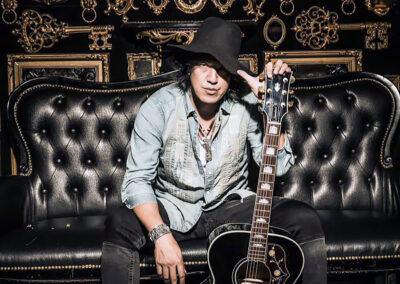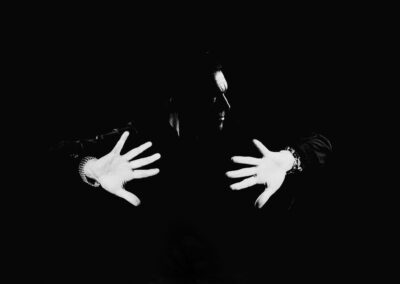VAMPS is a Japanese rock band formed in 2008 by Hyde, the vocalist of the popular rock band L’Arc-en-Ciel, and K.A.Z, the guitarist of the band Oblivion Dust. The band is known for their energetic and hard-hitting rock sound, blending elements of alternative rock, hard rock, and metal. VAMPS gained significant popularity both in Japan and internationally, with their dynamic live performances and catchy songs. They have released several albums and singles, including “VAMPS” (2009), “BEAST” (2010). Coming this fall on Spinefarm Records / Universal Music, the highly anticipated album “Sex Blood Rock N Roll” by VAMPS is set to captivate a wide range of listeners, extending beyond just J-Rock fans. This album serves as a best-of compilation, featuring the duo’s finest tracks. Each song has been meticulously re-recorded and/or remixed, with special attention given to the vocal parts, incorporating numerous English passages. During their Parisian concert, we had the privilege of meeting Hyde and KAZ backstage at the iconic Olympia venue, just moments before their electrifying performance. It was an exciting opportunity to gain insight into their creative process and witness their energy before they took the stage.
——What is the difference for a musician between reworking old songs and writing new ones?
Hyde: Ah, it’s definitely a different approach, no doubt about it. Creating a song from scratch is like starting with a blank canvas, where you have the freedom to explore endless possibilities and let your creativity flow. It’s a more challenging exercise (than reworking old songs) because you’re building something entirely new, from the melodies to the lyrics and the overall structure. It requires tapping into your deepest emotions and finding inspiration from various sources. On the other hand, reworking old songs is a unique endeavor in itself. It’s like revisiting a familiar landscape and finding new ways to breathe life into it. It’s not an easy task, as you have to strike a balance between honoring the original essence of the song while infusing it with fresh elements and perspectives. It’s about taking something familiar and making it feel exciting and relevant again. For me, this best-of album presented a thrilling challenge. We wanted to rework our sound, elevating it to new heights, making it more intense and captivating. It allowed us to delve into our own musical history, revisiting songs that hold a special place in our hearts, and giving them a fresh perspective. It’s a chance to reflect on our growth as artists and to showcase our evolution to the world. It’s a testament to our dedication to continuously push boundaries and explore new territories within our music. In the end, whether reworking old songs or creating new ones, both processes offer unique challenges and rewards. They allow us to express ourselves, connect with our audience, and leave a lasting impact through the power of music.
——Was it challenging to rewrite the lyrics in a foreign language while preserving their spirit and essence?
Hyde: When it came to reworking the lyrics, we wanted to ensure that the essence and emotions conveyed in the original songs remained intact, even when translated into a different language. To accomplish this, I collaborated closely with a translator who assisted me throughout the project. Together, we carefully examined the meanings and emotions behind each line, striving to capture the essence of the songs. The translator provided me with a list of words and phrases that closely matched the sounds and sentiments of the original lyrics. From there, I had the opportunity to select the ones that resonated with me the most, allowing me to infuse the translated lyrics with my own personal touch. Undoubtedly, this was one of the most challenging aspects of creating this best-of album. We wanted to maintain the original spirit of each song, preserving the stories they told, the unique sounds they possessed, and the overall atmosphere they exuded. It required a delicate balance of staying true to the original while adapting it to fit the new language. Throughout the process, we strived to ensure that the translated lyrics carried the same emotional weight and impact as the originals. It was crucial to capture the essence of the songs, allowing listeners to connect with the music on a deeper level, regardless of the language barrier. While it was undoubtedly a demanding task, it was also an incredibly rewarding one. It allowed us to explore new linguistic territories and expand the reach of our music to a broader international audience. We hope that fans, both old and new, will appreciate the effort and find a connection with the music that transcends language barriers.
——Do you worry about disappointing your fans by singing in English, considering that some Westerners believe that Japanese artists lose their added value and sincerity when they abandon their native language?
Hyde: Ah, that’s a challenging question. We are aware that our most dedicated fans are those who prefer to hear us sing exclusively in Japanese. However, we also have a strong desire to expand our reach and connect with a broader international audience. It seems that singing in Japanese can sometimes create a barrier to achieving this objective. Japanese language and music have a unique place in the market, almost forming a distinct category of their own. While we cherish our Japanese songs and will continue to create them, we also want to break through this niche and reach a wider audience. English serves as a means to overcome this boundary and connect with listeners who may not be familiar with the Japanese language. It’s important to note that our decision to sing in English is not about abandoning our roots or diluting our sincerity. We understand the concerns of fans who feel that singing in English may diminish the impact and authenticity of our music. But, we believe that music has the power to transcend language barriers and evoke emotions regardless of the words being sung. By incorporating English into our repertoire, we hope to bridge the gap between cultures and create a more inclusive musical experience. It’s about sharing our artistry with a wider audience and inviting them into our world. We want to maintain our unique identity while embracing the opportunity to connect with people from diverse backgrounds. Ultimately, our intention is not to disappoint our fans, but rather to expand our horizons and explore new creative possibilities. We appreciate the support and understanding of our loyal fans who have been with us on this journey, and we hope that they will continue to embrace our music, regardless of the language in which it is sung.
——What are the primary themes explored in your songs and what inspires your songwriting process?
Hyde: When it comes to writing lyrics, I don’t have a specific favorite subject that I gravitate towards. Each song is a unique and distinct expression, stemming from a different perspective and approach. Inspiration strikes me in the moment, and it arises from a spontaneous and organic place. I find that the inspiration for my lyrics emerges as I compose the music itself. The melodies, harmonies, and rhythms serve as a catalyst, evoking emotions and thoughts that I feel compelled to express. It’s a symbiotic relationship between the music and the lyrics, with each element inspiring and influencing the other. The beauty of this creative process is that it allows me to explore a wide range of themes and ideas. From introspective reflections on personal experiences to social commentary and abstract concepts, there are no limitations to the subjects I can delve into. It’s about capturing the essence of the emotions and messages I want to convey and finding the most authentic and impactful way to express them through the lyrics.
——How does the visual aspect of the group hold significance for you?
Hyde: (laughs) Well, I must admit, the visual aspect of a group plays a significant role in its overall identity. I believe that the image a musician portrays is undeniably intertwined with their music. When artists embrace a visual universe that complements their music, it adds an extra layer of intrigue and captivation. While it is true that one can create exceptional music regardless of their physical appearance, I personally find that musicians who invest in their visual presentation tend to be more compelling. It’s not about conforming to societal beauty standards or body ideals, but rather about creating a complete and immersive experience for the audience. When a band goes the extra mile to develop a visually striking aesthetic, it demonstrates a commitment to their craft and a willingness to fully engage with their artistry. It’s about creating a cohesive package that encompasses not only the auditory experience but also the visual and sensory elements. Of course, it’s important to emphasize that the visual aspect should never overshadow the music itself. The music remains the core and foundation of any artist’s work. However, when the visual presentation aligns harmoniously with the music, it can enhance the overall impact and create a more memorable and immersive experience for both the performers and the audience. In the end, it’s about finding a balance between the visual and musical elements, allowing them to complement and elevate each other. It’s not about superficiality or conforming to societal expectations, but rather about creating a complete artistic expression that resonates with the audience on multiple levels. So, while the visual aspect is important to me, it is always secondary to the music itself. It’s about creating a cohesive and captivating experience that leaves a lasting impression on the audience.
——It appears that you have a specific fascination with vampires. What is it about them that captivates you?
Hyde: I must confess, I find myself drawn to vampires and their unique way of existence. In many ways, I identify with them and their lifestyle. Now, don’t worry, I don’t actually drink blood, but I do have a fondness for indulging in wine… perhaps a bit too frequently (laughs). For me, vampires embody the essence of the romantic hero. They possess an allure and mystique that is incredibly captivating. I am particularly inspired by the beauty and elegance they exude. There is something enchanting about their enigmatic nature and the air of mystery that surrounds them. Plus, I find that vampires symbolize a certain duality that resonates with me. They navigate between the realms of darkness and light, embracing both the night and the day. This duality mirrors my own lifestyle, as I often find myself awake during the night and retiring to bed in the early hours of the morning. I think, vampires have a strong connection to femininity. I am deeply inspired by women, and they play a significant role in my creative process. Their presence and influence fuel my artistic expression, and I find that vampires embody a certain allure and fascination that is often associated with the feminine. In essence, vampires encapsulate a sense of beauty, mystery, and elegance that captivates my imagination. They serve as a source of inspiration and allow me to explore themes of duality and the allure of the night. While my fascination with vampires may be metaphorical, it remains a significant influence on my artistic expression and the world I create through my music.
——Let’s engage in a little game. When you hear the following three words – Sex, Blood, and Rock N Roll – what images, ideas, or perspectives come to mind?
Hyde: Ah, I’m up for it! Let me think. Sex? This word immediately conjures up images of a vibrant stage performance. The exhilaration and intense emotions that surge through me when I’m on stage, surrounded by people who genuinely love and appreciate the music I offer them. It’s an indescribable experience, unlike anything else. Now, Blood? Well, that brings to mind the association with wine and alcohol in general. It’s my personal source of rejuvenation, a way to unwind and find solace. There’s something about indulging in a glass of wine or enjoying a drink that allows me to replenish my energy and find inspiration. Lastly, Rock N Roll. This phrase speaks volumes on its own. To me, it represents the essence of music and all the boundless possibilities it presents. Rock N Roll is not just a genre, but a way of life. It encompasses my passion, my purpose, and my reason for being. It’s not just a hobby or a fleeting interest; it’s a fundamental part of who I am. In summary, these three words evoke powerful imagery and emotions for me. Sex brings forth the electrifying energy of a stage performance, Blood symbolizes the regenerative power of wine and alcohol, and Rock N Roll encompasses the very core of my existence, representing the limitless potential of music.
——Time’s running. This is my last question.
In comparison to your other respective groups, what does VAMPS bring to you?
Hyde: With VAMPS, I have been able to cultivate a more refined aesthetic that I have almost complete control over. It allows me to explore both the lighter and heavier aspects of music, embracing the essence of Rock N Roll. Through VAMPS, I find joy and a sense of artistic freedom that is unparalleled.
K.A.Z: Absolutely, VAMPS brings a sense of lightness to our music. It allows us to delve into different dimensions and create a more diverse and dynamic experience for our audience.
__________________
Mandah FRÉNOT
(c) VMJ




